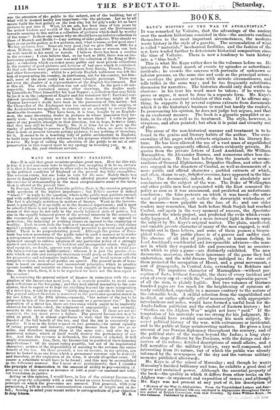WANT OF OREAT MEN TAXATIOX.
Son—It is said that great oecasionsproduce great men. How far this rule is true it is not necessary here to inquire ; but, accepting- it to be so, certain it is that it forms no exception to other rules in being without an exception, as the political condition of England at the present day fully exemplifies. The occasion exists, but one looks in vain for the man. Surely there was never in England's history a period which afforded greater opportunity for the exercise of statesmanship in the must comprehensive sense of the term, than is offered at the present time. In Foreign, Colonial, and Domestic politics, there is the occasion "regnant with questions of the highest importance; but Echo's answer is indeed '" where? " in reply to the question, where isthe public man patriotic enough and with sufficient ability to deal with a master's hand with any one of them ? The fact is glaringly notorious in matters of finance. Weak as -the Govern- ment is generally, it is specially so in the fivancial department; and it must be admitted there is not much more show of strength an the other side. The reason of this may lie not only in the nicely balanced state of parties, but also in the equally balanced power of the several interests in the eountry,-- the commercial as opposed to the agricultural ; free trade as opposed to protection; the industrial or working classes as opposed to the employing or wealthy. Each in turn feels the burden of taxation as too heavy, and claims special exemption ; and each is sufficiently powerful to prevent such partial relief. There is no preponderating power. Although the genius of Free- trade has taken possession of the public mind in such a manner as to render a retrogression to restriction impossible, the public are not informed or en- lightened enough to enforce adoption of any particular policy of a strongly marked and decided nature. To indolent and incompetent minds, this poli- tical equipeise, no doubt, appears very admirable; for to such it would jus- tify laissez-fab ism and indifferentism; whereas it is just the precise occa- sion which an able and energetic statesman would grasp as the most suitable for progressive and reformative legislation. That out fiscal system calls for complete religion, men of all parties are agreed. The present mode of taxa- tion is based on anomalous and inconsistent principles, which in practice operate harshly and unjustly on classes least capable of bearing the imposi- tion. How much, then, it is to be regretted we have not the man equal to the occasion !
In considering the general subject of finance in connexion with the ex- piration-of the Income-tax next year, it is scarcely possible to avoid sonic • such reflections as the foregoing ; and they lead almost inseusibly to the :con- clusion, that to expect or to hope for anything beyond the more reimposition of a direct tax, would be useless. "Little things are suitable to little men." The general subject therefore is narrowed to the particular question stated in my last letter, of the 20th ultirno,—namely, "the nature of the tax to be proposed in lieu of the present one on inuome as a permanent tax." Iii the imposition of a direst tax, there are two rules which ought to be implicitly observed for its basis,—first, the minimum of unpopularity; and secondly, security to the revenue of the full 'benefit of the tax. If these are not re- cognized, the tax must prove a failure. The present Income-tax may be ' cited in proof. It is almost superfluous to state that the revenue is de- Irauded of the full benefit of the tax, and that the tax is excessively un- popular. It is so in the latter respect on two grounds,—its unfair equality of rating property and industry, regarding income from the two as si- milar, and therefore taxing them at the same -rate; and also its in- quisitorial nature, which of itself would destroy the permanency of any tax. And that the revenue is defrauded, the returns of oehedule D will amply demonstrate. Can, then, the Income-tax be purified of these damning perfections? Of its unjust ratiug possibly, but not of its inquisitorial character; neither of the impossibility of securing to the revenue the entire benefit of the tax. On these grounds, a tax on income, in my opinion, can Dover be looked toss one from which a permanent revenue can be derived ; and therefore, at the expiration of its term, it should altogether cease. Of course a wheal:its would have to be found ; and this may be accomplished in the following manner. But I must state preliminarily, that I consider the principle of clemareatioa in the amount of ability to pay—existing Lt present in the hoe nrawa at incomes of 150/.4 year—as U.SSOWILI and with- out foundation in justice. Acting on this opinion, I would have, in lieu of the existent Income-tax, one on property conjointly with a rate levied an every householder, on thse principle on which the poor-rates are assessed. This proposal, with your permission. I walla another communication examine at length and in do- toil; bearing in mind your meant :notice to correvondenie at your objection


























 Previous page
Previous page